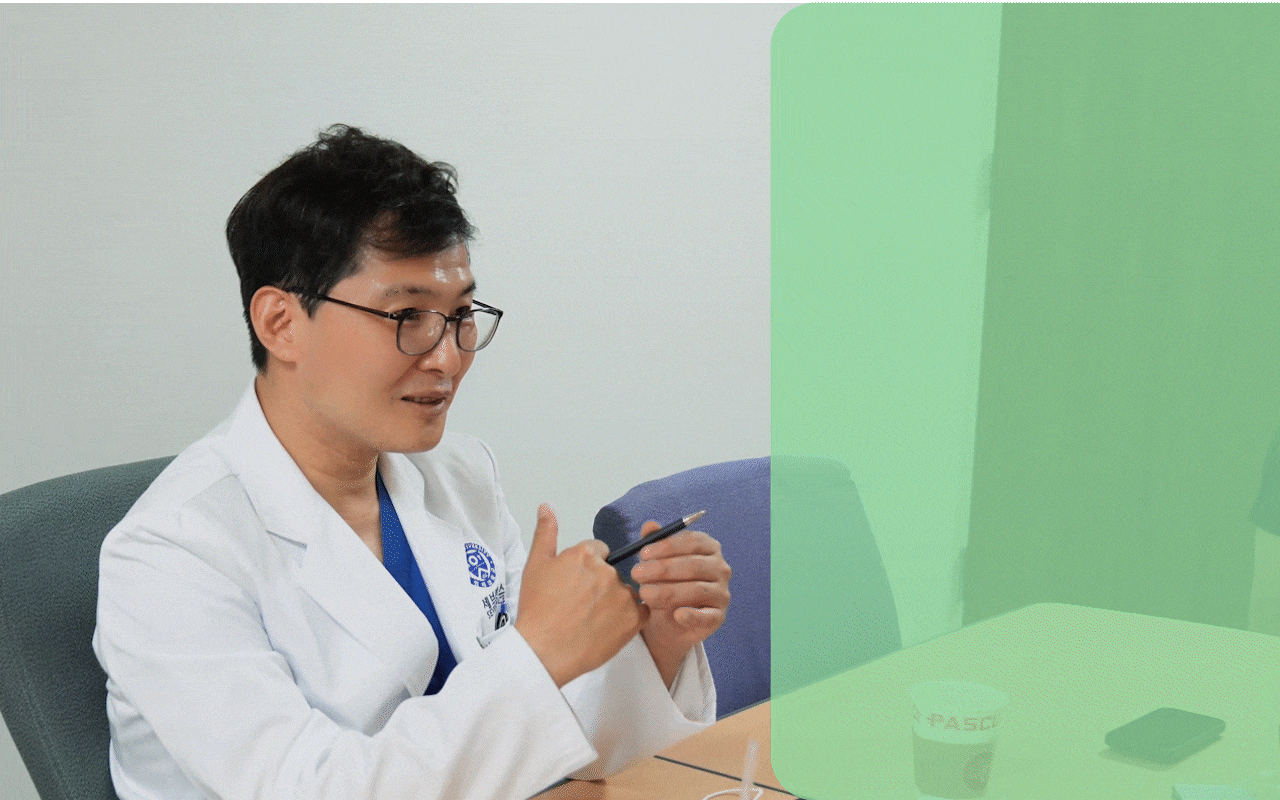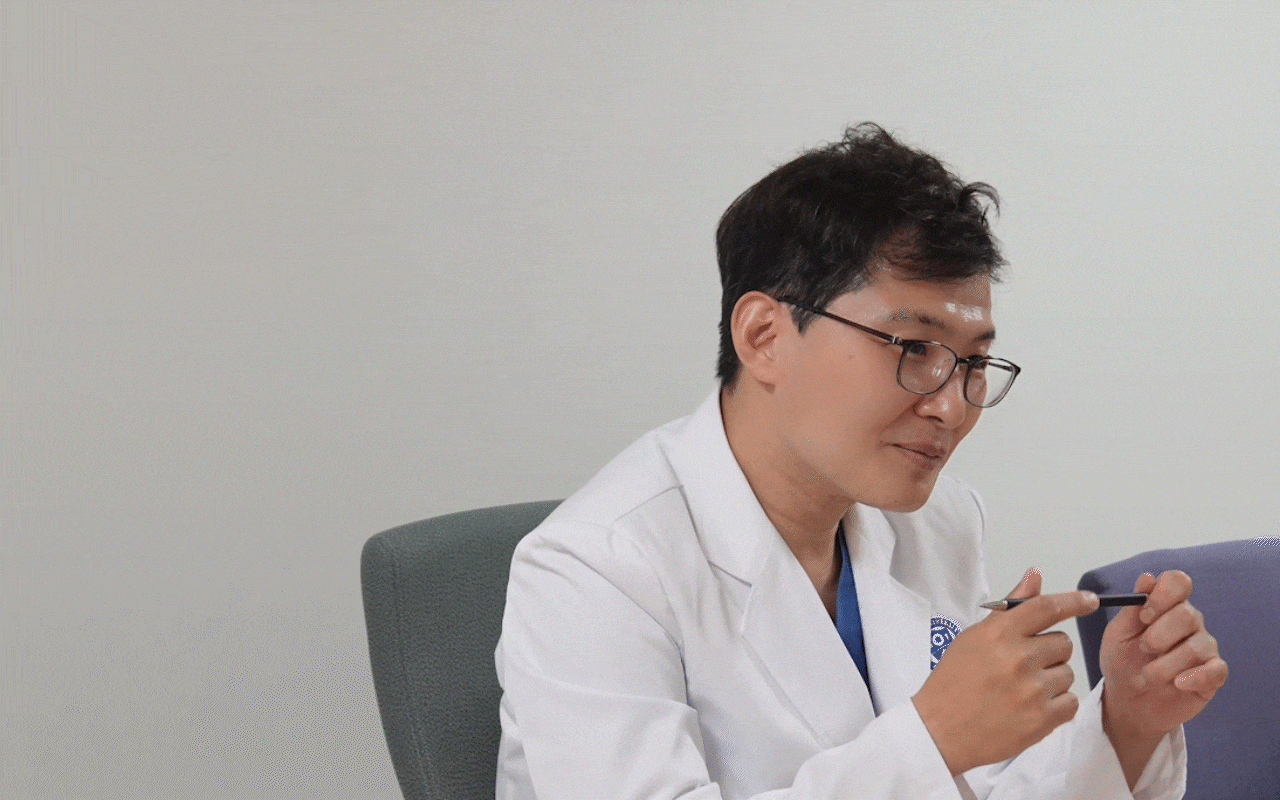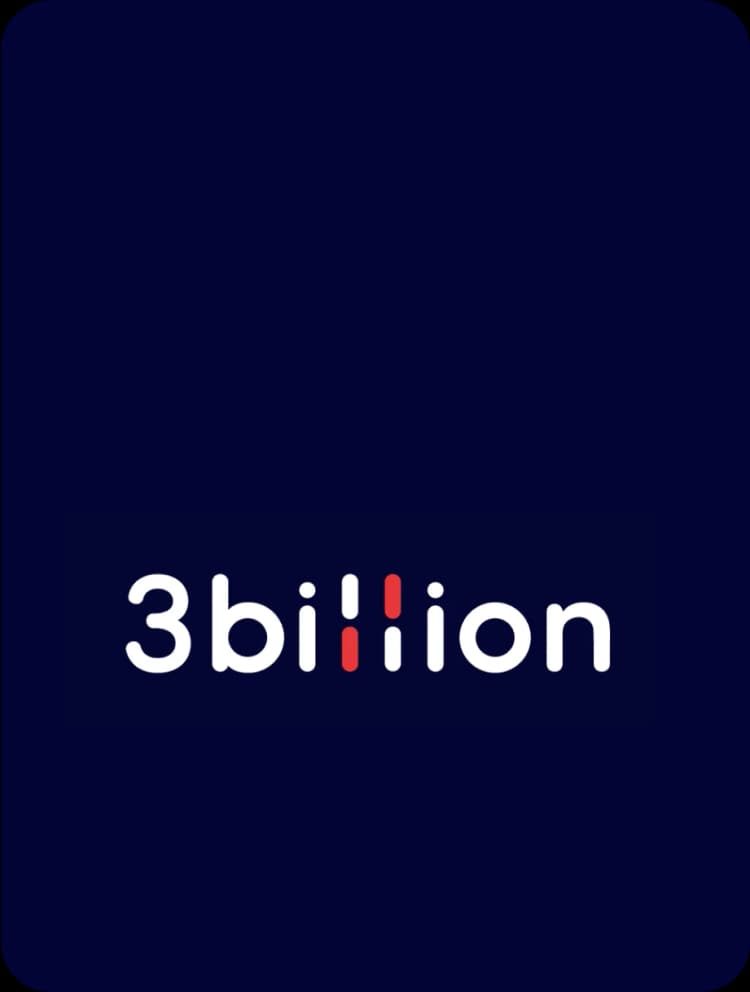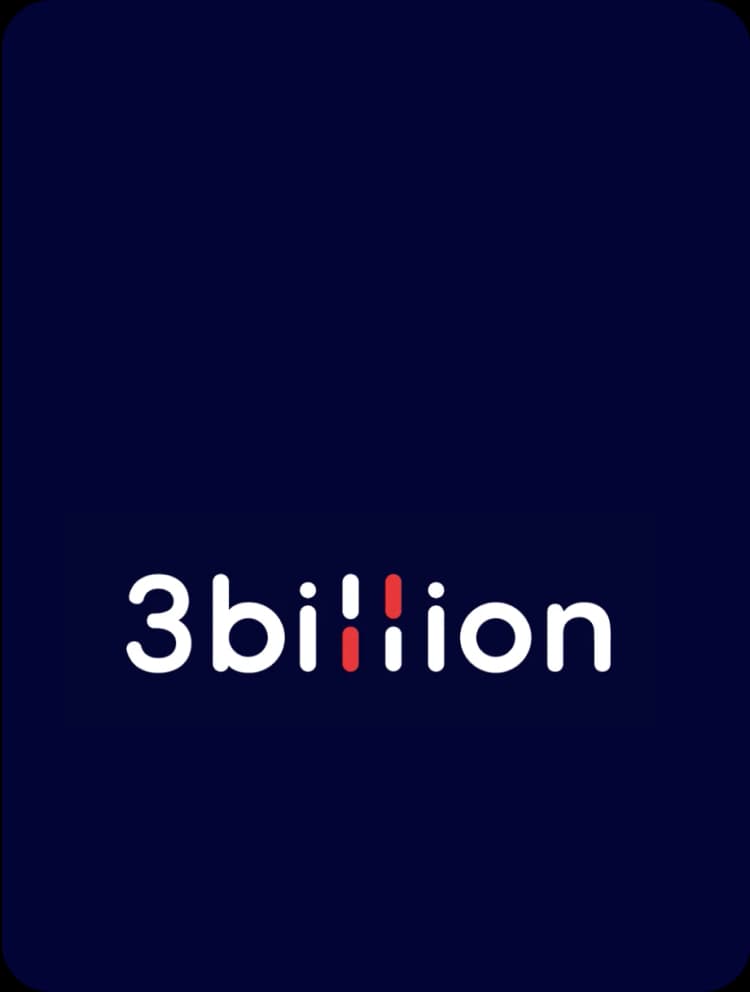Cardiac genetic testing, Fabry disease: Interview with Dr. Geu Ru Hong
‘The Good Doctors’ is a programmed series of interviews to meet doctors who face patients with rare diseases every day and hear their stories on site. These interviews were planned to help us provide better insight for physicians by recording how genetic testing for rare diseases is conducted, how it’s used at clinical sites, and how it can be improved.
Our first guest is Doctor Geu Ru Hong from Severance Hospital. He has been with the Yonsei University College of Medicine as a professor of cardiology since 2012 and is currently leading the hypertrophic cardiomyopathy and Fabry disease clinic. Although he does not specialize in clinical genetics, he has been a pioneer in adopting and employing the most advanced diagnostic technologies.
* This article is based on the interview conducted at Yonsei Severance Hospital on June 8.
Genie
Hello, Professor. Thank you for agreeing to this interview and taking time out of your busy schedule (In fact, there were a lot of patients waiting to meet the professor on the day of the interview).
What type of a doctor do you consider yourself to be?
Genie
You have been active not only at the clinical sites but also by participating in several broadcasts, academic conferences, and interviews as an expert in cardiovascular diseases. What type of a doctor do you consider yourself to be or what kind of doctor do you wish to become?
Dr. Hong
Since I was a child, I thought “A should be like B.” Students should be like students, soldiers should be like soldiers, politicians should be like politicians, and doctors should be like doctors. So, when I entered medical school, I spent a lot of time thinking about what makes doctors who they are, and I then realized that the heart is what makes people feel alive. Creating a healthy heart and treating the heart seemed like the most doctor-like duty in that they can assist a person to continue living. That is why I chose the department of cardiology.

When you meet a lot of patients, you find out that the lifestyle and severity of symptoms in patients vary greatly, even if they suffer from the same disease. There are students busy with their studies, housewives busy with children, the elderly, and so on.
Therefore, the same disease should not be treated in the same manner for all patients. I believe suggesting the most optimal treatment method and cycle best suited for each patient, considering their symptoms and lifestyle, means genuinely caring for a patient. Completely personalized treatment is not only about treating the underlying causes of symptoms but also about improving patients’ quality of life. It is essential to not solely rely on traditional knowledge of medicine but to keep searching and adopting new knowledge. It is not easy, but I am trying to be that kind of a doctor.
Since I was a child, I thought “A should be like B.” Students should be like students, soldiers should be like soldiers, politicians should be like politicians, and doctors should be like doctors. So, when I entered medical school, I spent a lot of time thinking about what makes doctors who they are, and I then realized that the heart is what makes people feel alive. Creating a healthy heart and treating the heart seemed like the most doctor-like duty in that they can assist a person to continue living. That is why I chose the department of cardiology.
Genie
It is often not easy to accept new things. Are you naturally a quick adapter?
Dr. Hong
I don’t think so. I only started using a smartphone a year ago and still feel uncomfortable using it. I feel that as much as it makes things more convenient, it also takes away a lot of things as you become accustomed to checking your phone anywhere, anytime.
However, I try to choose and focus instead. Particularly, when it comes to my work, I enjoy and appreciate experiencing new things more than anyone. I love learning about new technology and fields and meeting new people and learning from them.
It has already been 10 years, but genetic diseases were lesser known then, and the most common cardiac genetic disease was hypertrophic cardiomyopathy (HCM). Thanks to advanced genomic technology and accumulated clinical data, several results showed that there are diseases with similar symptoms as HCM and that HCM may need to be subdivided into different diseases. Once, there was a patient suspected with HCM, and after hearing the details of the symptoms from the patient, I noticed that something was different. Back then, next-generation sequencing (NGS) was still new, but I went ahead with NGS-based genetic testing, and the patient was diagnosed with “Fabry disease”
Fortunately, the patient was diagnosed in time and was under the appropriate drug treatment. The patient continued the drug treatments and is healthy now. After the incident, I was a little taken aback. If I had not opted for cardiac genetic testing, the patient would have been misdiagnosed with HCM and put under treatment for HCM.
I took this incident as an opportunity to strengthen my specialty and opened a clinic for HCM and Fabry disease focusing on personalized diagnosis and treatment. There are approximately 200 patients with Fabry disease in Korea, and 50 of them have been diagnosed and are receiving treatment in our clinic. I think I am improving at providing personalized treatment as my experiences accumulate.
How did you become familiar with a genetic diagnosis?
Genie
Genetic testing was just introduced into medical fields 10 years ago (although single gene tests were already in use).
Dr. Hong
Genetics was my most difficult subject in medical school (laugh). There was a lot to memorize and it was very confusing. However, since HCM is one of the most representative genetic diseases with high incidence rates, I naturally became familiar with genetics. Further, because clear pathogenic variants for HCM are well known, genetic testing for HCM is often used in the medical field. They are even used for prevention purposes in certain cases.
Particularly, soccer players who run for a long time during matches require strong cardiorespiratory endurance. There have been cases where the players have suffered cardiac arrests or sudden cardiac deaths during a match (Eriksen from the Denmark national team). There can be various reasons for such incidents, but in the case of young players, it is often caused by genetic variants associated with HCM, Brugada syndrome, and Long QT syndrome. That is why national players are now required to check for any abnormalities in heart thickness through ultrasound or screen for genetic variants of potential risk before participating in a match. So, some people in a specific work environment may need such preemptive screening tests to prepare for future risks.
What are the benefits of genetic testing in the diagnosis of Fabry disease?
Genie
So, Fabry disease is one of the diseases that can be confused with HCM. I believe diagnosing such metabolic diseases with general symptoms in multiple organs can be difficult. How can genetic testing help in such instances?
Dr. Hong
Fabry disease actually has available treatments, so early diagnosis can have significant benefits for patients. In the past, when 1,200 patients previously diagnosed with HCM were retested, 20 of them were found to have Fabry disease. It is hard to distinguish between the two diseases based on the symptoms alone since both diseases are characterized by thickening heart muscles, and not all organs are examined during diagnosis.

However, because Fabry disease is classified as a rare disease, the patients and their families often show strong resistance and sometimes even refuse to get tested, even though Fabry disease is really not that different from diabetes. Maybe it can be considered as a little more expensive form of diabetes. Fabry disease has an available treatment and can be diagnosed with a cardiac genetic testing. If a patient is diagnosed, their family members can be screened with a family test for early diagnosis. So, Fabry disease is a disease that can be easily prevented and treated.
Like how we manage multiple complications caused by a lack of insulin in diabetes, managing various complications resulting from the accumulation of Gb3 induced by variants in the GLA gene in Fabry disease is essential. The patients can still be considered lucky since there are treatments available.
Genie
It’s a difference in expression, but the impact on patients seems to be significant. As you said, the resistance coming from the term rare disease seems to increase the feeling of fear in patients and their families. It seems that the process of interacting with the patient and helping them understand, in other words, communication, is the essential part of the diagnosis.
Dr. Hong
I agree. That is why our clinic is working hard to improve our expertise in genetic counseling. Patient satisfaction is excellent since we manage various complications as a multidisciplinary team rather than having a specific department make fragmented diagnostic and treatment decisions.
How is your experience with the project you are participating in with 3billion?
Genie
You are currently participating in a project (in partnership with Takeda and 3billion) to identify patients with Fabry disease. What aspects do you like about the method used in this project compared with the previous method?
Dr. Hong
Previously, Fabry disease was mostly dealt by the department of pediatrics and clinical genetics. Genetic diseases were perceived as new and challenging by physicians. So, when a patient was suspected of having a genetic disease, we often transferred the patient to those departments. We lost some patients during this process. For example, some patients dropped out midway and some refused to receive treatment after diagnosis.
The advantage of the testing method we are conducting now is that the physicians can directly request for the test on-site. We know the patient the best, and no matter how advanced the genetic technology is, accurate diagnosis can only be obtained with proper interpretations based on the patient’s symptoms. We can explain to the patient the importance of getting tested and obtainaing the sample immediately. Moreover, we do not need to draw blood from the patient, which is a big advantage.
Genie
Those are valuable opinions. It can be difficult for the patients to visit various departments for diagnosis and treatments in a big hospital. In this case, the patient may feel that the physicians are taking responsibility for them through the whole process and trust physicians more.
There are constant advancements in NGS-based tests. There have been expansions from panel to WES and WES to WGS. You have experience with various tests from multiple analytical institutions. What do you think are the advantages and disadvantages of each?
Dr. Hong
I think WES is unnecessary when a specific disease is suspected. When there is a wide range of symptoms such as in metabolic disorders, and it is difficult to distinguish the underlying symptoms from the secondary symptoms, then WES can be helpful.

What Makes Our Exome Testing Advanced?
Find out how our enhanced exome solutions deliver better coverage and accuracy.
Genie
This is one of our biggest concerns. What range of information do you prefer in a result report?
Dr. Hong
Do I have to choose an answer? (laugh). Obviously, a report with a clear conclusion is preferable since we sometimes fail to see the specific details as we have to deal with a lot of patients. Physicians usually have a suspected disease in mind. When the report shows the diagnostic result for that specific disease, then the report alone is enough. But when the patient is diagnosed with diseases other than the ones suspected, the physicians become curious about the details of the diagnosis. Why was a different diagnosis made? In these cases, the detailed results can be helpful. It helps a lot that 3billion has a very accessible communication channel for consulting the clinical team.
Genie
That is very good to hear. We also benefit a lot from such experiences. We try our best to produce accurate diagnoses with the given information, but in the end, nobody knows more about the patient than the physicians. So we can improve from the opportunities to hear and get feedback from the physicians directly. Please feel free to contact us anytime.
What would you like to see improved as you meet patients in the hospital?
Genie
It is true that many technologies are being used and developed for personalized treatment and management of patients. But there still seems to be much work left to be done. Do you have any requests you wish to make to the companies that are in this field?
Dr. Hong
It can be helpful to know a patient’s exact disease, but the benefit from such a diagnosis is insufficient as the testing remains expensive. I think a step-by-step approach is necessary. General screening tests are essential, but it would be nice if there were services with lower price burdens for diseases that have available treatments (like Fabry or Transthyretin (TTR) Amyloidosis) or a specific action plan upon diagnosis. There are more diseases like these than you think.
Genie
Yes, that is a good point. The effectiveness of a test may increase when an appropriate treatment plan can be provided upon diagnosis.
The final question. How would you describe 3billion in one phrase?
Genie
I will wrap up the interview with a surprise question. Please tell us in a short phrase about what kind of company you think 3billion is.
Dr. Hong
That really is a surprising question. I would say…pioneer of genetic diseases! A company that simplifies complex and difficult tests. I believe 3billion is a groundbreaking company with very reliable test results.
In the past, our only option was to send the test overseas. The fact that we no longer need to do so gives hope to not only the patients but also to doctors like us.
Genie
That was a very flattering response. We will make sure we are worthy of such compliments. Thank you again for agreeing to this interview despite your busy schedule. Some people mistakenly think we are interfering with the roles of the medical staff. We want to make sure that we can never replace the medical staff in the field and that our goal is to be a companion that can help physicians save time and focus more on their patients.
Dr. Hong
Of course. I also consider 3billion as a colleague who helps me approach a difficult subject more easily and with whom I can discuss. Better answers can be provided to the patient through cooperation.
Genie
Yes, we will definitely do so. Thank you. We will share your positive experiences with our fellow physicians.
Get exclusive rare disease updates
from 3billion.

Sookjin Lee
Expert in integrating cutting-edge genomic healthcare technologies with market needs. With 15+ years of experience, driving impactful changes in global healthcare.




